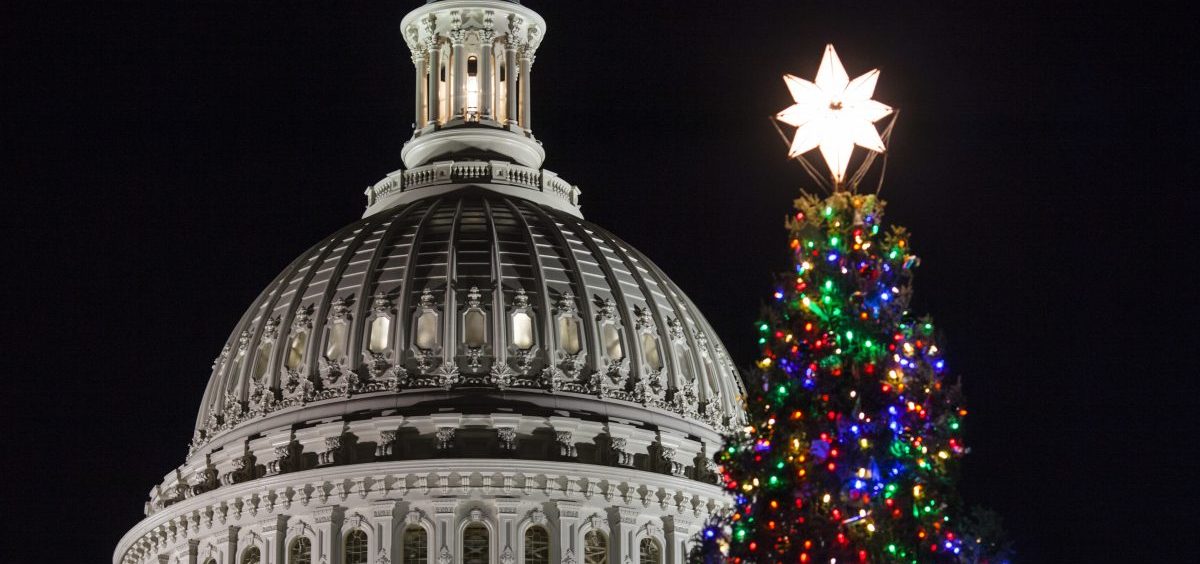News

House Action, Trump Approval Uncertain After Senate Passes Plan To Avert Shutdown
By: Kelsey Snell | Brian Naylor | NPR
Posted on:
Updated at noon ET
Plans for a speedy vote on a short-term spending bill crumbled ahead of a Friday night deadline as some House Republicans threatened to pull their support for any spending measure that does not include additional border security money.
A contingent of House Republican lawmakers, including House Speaker Paul Ryan, R-Wisc., planned to meet with the president at the White House midday Thursday as House GOP leaders struggled to convince members to support a bill to extend current spending levels through Feb. 8. Many are concerned that Republicans will not have another chance to fulfill President Trump’s demand for $5 billion to build a wall on the border with Mexico. The Senate approved the measure Wednesday night.
“At this moment, the President does not want to go further without border security, which includes steel slats or a wall,” White House Press Secretary Sarah Huckabee Sanders said in a statement. “The President is continuing to weigh his options.”
Conservatives such as Rep. Mo Brooks, R-Ala., say voting on the short-term spending bill without border wall money amounts to a surrender on one of Trump’s signature campaign promises. Brooks said he is confident that the House could uphold a veto — if a spending bill does pass and Trump refuses to sign it. But Brooks, like most Republicans, said they have no clear sign from Trump about what he’s willing to support.
“That is the $5 billion question,” Brooks said. “I wish we had clarity on that, that would help us decide what to do.”
Trump tweeted Thursday morning that Democrats know “Steel Slats (Wall) are necessary for Border Security” and are “putting politics over Country” by refusing to fund the wall. He also threatened “not to sign any of their legislation, including infrastructure, unless it has perfect Border Security.”
In a tweet later in the morning, Trump said he was “promised the Wall and Border Security” by congressional leadership when he signed a spending package last year and that “it didn’t happen!”
Frustration with the spending bill extends beyond a core group of conservatives who typically oppose spending bills. Some reliable leadership allies, such as Rep. Steve Womack, R-Ark., also expressed concerns about the spending bill.
“This is a different circumstance. We’re about to lose the majority and we’ve made promises that haven’t been kept,” Womack said. “If we aren’t willing to fight now on the way out of the majority, then when are we willing to fight?”
Republican leaders had hoped to easily approve the spending measure to avoid a last-minute panic over spending. Funding for about a quarter of the government will run out at midnight on Friday, and the government will be forced to partially close unless the spending measure is agreed to.
Support among House Republicans began to crack Wednesday night before the Senate vote even occurred.
Members of the House Freedom Caucus, some of the most conservative members of Congress, railed against the wall-less spending plan in a string of speeches on the House floor. The group’s chairman, Rep. Mark Meadows, R-N.C., urged Trump to veto the spending measure, saying “We’re going to back you up. If you veto this bill, we’ll be there.”
The frustration grew Thursday morning during a closed-door meeting of House Republicans. Members emerged confused about the plan for the spending bill, telling reporters that the entire plan for a vote expected later in the day was up in the air.
Ryan, the House speaker, stepped out of a closed-door meeting of GOP House members Thursday morning to take a phone call from the president. As that call stretched on, leadership members decided to cancel a regularly scheduled press briefing ahead of a meeting at the White House.
Rep. Steve Scalise, R-La., the top House Republican vote counter, told reporters that Republicans might need to reconvene later in the day to continue their discussions.
“We had an honest conversation about where we are and where we want to be to confront this problem at the border and get the president the tools he needs,” Scalise said. “We’re in conversations with our members and the president, and it’s early in the day.”
The spending measure, also known as a continuing resolution or CR, would fund nine cabinet-level departments and several independent agencies through Feb. 8, when Congress would again be forced to confront the issue. But Democrats, who will control the House in the next Congress, have adamantly refused to provide money for a wall.
In a speech Wednesday, Senate Majority Leader Mitch McConnell, R-Ky., said he was “sorry that my Democratic colleagues couldn’t put the partisanship aside and show the same good-faith flexibility that the president has shown in order to provide the resources our nation needs to secure the integrity of our borders as well as the safety of American families.”
The temporary spending bill does include $1.3 billion for border security. House Minority Leader Nancy Pelosi, D-Calif., released a statement on Wednesday indicating she supports the stopgap bill, and it’s likely most House Democrats will vote for the legislation.
Asked about the possible next steps after Thursday morning’s developments, Pelosi told reporters she was reluctant to comment but then jabbed, saying we’re in “the middle of a meltdown on the part of Republicans.”
A presidential veto would mean that hundreds of thousands of federal employees including Border Patrol, FBI and DEA agents and TSA officers would continue to work over the Christmas holiday but without pay, while hundreds of thousands of other federal workers would be furloughed.
9(MDI4ODU1ODA1MDE0ODA3MTMyMDY2MTJiNQ000))

